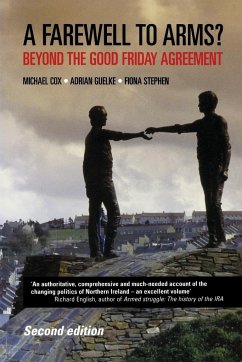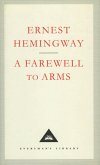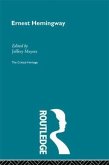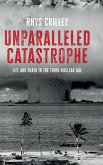- Broschiertes Buch
- Merkliste
- Auf die Merkliste
- Bewerten Bewerten
- Teilen
- Produkt teilen
- Produkterinnerung
- Produkterinnerung
This study covers both the domestic and the international dimensions of the peace process, and is the first to deal seriously with the impact of the war on terror on the situation in Northern Ireland. It is also the first book to look at the Good Friday Agreement since the collapse of the Executive and the historical 2003 elections.
Andere Kunden interessierten sich auch für
![A Farewell To Arms A Farewell To Arms]() Ernest HemingwayA Farewell To Arms17,99 €
Ernest HemingwayA Farewell To Arms17,99 €![A Farewell to Arms A Farewell to Arms]() Ernest HemingwayA Farewell to Arms32,99 €
Ernest HemingwayA Farewell to Arms32,99 €![A Farewell to Arms A Farewell to Arms]() Ernest HemingwayA Farewell to Arms9,49 €
Ernest HemingwayA Farewell to Arms9,49 €![Ernest Hemingway Ernest Hemingway]() Ernest Hemingway24,99 €
Ernest Hemingway24,99 €![A Farewell to Wars A Farewell to Wars]() Hans Blix (International Atomic Energy Agency)A Farewell to Wars87,99 €
Hans Blix (International Atomic Energy Agency)A Farewell to Wars87,99 €![A Farewell to Wars A Farewell to Wars]() Hans Blix (International Atomic Energy Agency)A Farewell to Wars30,99 €
Hans Blix (International Atomic Energy Agency)A Farewell to Wars30,99 €![Unparalleled catastrophe Unparalleled catastrophe]() Rhys CrilleyUnparalleled catastrophe118,99 €
Rhys CrilleyUnparalleled catastrophe118,99 €-
-
-
This study covers both the domestic and the international dimensions of the peace process, and is the first to deal seriously with the impact of the war on terror on the situation in Northern Ireland. It is also the first book to look at the Good Friday Agreement since the collapse of the Executive and the historical 2003 elections.
Hinweis: Dieser Artikel kann nur an eine deutsche Lieferadresse ausgeliefert werden.
Hinweis: Dieser Artikel kann nur an eine deutsche Lieferadresse ausgeliefert werden.
Produktdetails
- Produktdetails
- Verlag: Manchester University Press
- 2 Revised edition
- Seitenzahl: 568
- Erscheinungstermin: 1. Januar 2006
- Englisch
- Abmessung: 234mm x 156mm x 30mm
- Gewicht: 870g
- ISBN-13: 9780719071157
- ISBN-10: 0719071151
- Artikelnr.: 21194402
- Herstellerkennzeichnung
- Libri GmbH
- Europaallee 1
- 36244 Bad Hersfeld
- gpsr@libri.de
- Verlag: Manchester University Press
- 2 Revised edition
- Seitenzahl: 568
- Erscheinungstermin: 1. Januar 2006
- Englisch
- Abmessung: 234mm x 156mm x 30mm
- Gewicht: 870g
- ISBN-13: 9780719071157
- ISBN-10: 0719071151
- Artikelnr.: 21194402
- Herstellerkennzeichnung
- Libri GmbH
- Europaallee 1
- 36244 Bad Hersfeld
- gpsr@libri.de
Michael Cox is a Founding Director of LSE IDEAS and Emeritus Professor in International Relations at LSE. He was appointed to a Chair in International Relations at the School in 2002. His more recent publications include a new edition of EH Carr's The Twenty Years' Crisis and a collection of his own essays entitled The Post-Cold War World, which was published in 2018. 2019 saw the publication of his new edition of JM Keynes's The Economic Consequences of the Peace, and in 2021 he edited and brought out EH Carr's 1945 long out of print classic, Nationalism and After. His most recent book, Agonies of Empire: American Power from Clinton to Biden, was published in 2022. He is currently completing a volume for Polity Books called Comrades: Xi Jinping, Putin and the Challenge to Western Liberal Order.
Introduction: A farewell to arms? Beyond the Good Friday Agreement -
Michael Cox, Adrian Guelke, and Fiona Stephen PART ONE. From 'Long War' to
long peace 1. Lost lives: Victims and the construction of victimhood' in
Northern Ireland - Marie Smyth 2. The background to the Irish peace process
- Martin Mansergh 3. From war to uneasy peace in Northern Ireland -
Caroline Kennedy-Pipe 4. Myths of consociationalism: From Good Friday to
political impasse - Paul Bew PART TWO. The politics of the Good Friday
Agreement 5. Polarisation or new moderation? Party politics since the Good
Friday Agreement - Jon Tonge 6. The 1998 Agreement: Three unionist
anxieties - Arthur Aughey 7. The SDLP- governing with uncertainty - Sean
Farren 8. Irish republicanism and the peace process: From revolution to
reform - Roger MacGinty 9. Noises off: Loyalists after the Agreement -
Gordon Gillespie PART THREE. Agreement at the crossroads 10. A farewell to
arms? Decommissioning and the peace process - Colin McInnes 11. New
beginnings? Policing and human rights after the conflict - Brice Dickson
12. The totality of relationships? The British / Irish Council - Stephen
Hopkins 13.`A 'most difficult and unpalatable part' - the release of
politically motivated violent offenders - Michael von Tangen Page 14. A
truce rather a treaty? The effect of violence on the Irish peace process -
John Darby PART FOUR. Civil Society 15. Segregation, ethno-sectarianism and
the 'new' Belfast - Peter Shirlow 16. Constitutionalism, civil society and
democratic renewal in Northern Ireland - John Morison 17. Two cheers for
the NGOs: Building peace from below in Northern Ireland - Feargal Cochrane
18. Integrated schools: Myths, hopes and prospect - Fiona Stephen 19
Whatever happened to the women? Gender and peace in Northern Ireland - Kate
Fearon 20 From 'long war' to 'war of the lillies': 'Post-conflict'
territorial compromise and the return of cultural politics - Cathal McCall
PART FIVE. Bringing in the international 21 From Anglo-Irish to
British-Irish relations - Paul Gillespie 22 Europe and the europeanisation
of the Irish Question - Elizabeth Meehan 23 The new American connection:
President George W. Bush and Northern Ireland - John Dumbrell 24 Political
comparisons: From Johannesburg to Jerusalem - Adrian Guelke 25 Learning
from other places: Northern Ireland, the Basque Country and Corsica -
Francesco Letamendia and John Loughlin 26 Peace processes in the late
twentieth century and beyond a mixed record - Fred Halliday 27. Rethinking
the international: A critique - Paul Dixon 28. Rethinking the
international: A defence - Michael Cox Conclusion: Peace after the Good
Friday Agreement? - Adrian Guelke, Michael Cox, and Fiona Stephen
Appendices 1. Chronology of Northern Ireland from war to peace 2. The Good
Friday Agreement (Belfast Agreement) 10 April 1998 3. 'Towards A Lasting
Peace', Sinn Fein document, 1992 (extract) 4. Joint Declaration on Peace
(Downing Street Declaration), 15 December 1993 5. A personal message from
Rt. Hon. Sir Patrick Mayhew, December 1993 6. The TUAS (Tactical Use of
Armed Struggle) document circulated by Republican leadership, summer 1994
7. IRA ceasefire statement, 31, August 1994 8. Combined Loyalist Military
Command (CLMC) ceasefire statement, 13 October 1994 9. A new framework for
agreement 1995 10. The Mitchell principles, January 1996 (extract) 11. IRA
ceasefire statement, 19 July 1997 12. 'Propositions on Heads of Agreement'
issued by British and Irish governments, 12 January 1998 13. The
Hillsborough statement, 1 April 1999 14. 'The Way Forward' joint statement
by British and Irish governments at Stormont, 2 July 1999 15. Statement
issued by the IRA, 21 July 1999 16. Statement by Senator George Mitchell
concluding the review of the Northern Ireland peace process, 18 November
1999 17. 'IRA Statement on Arms Inspection' 26 June 2000. 18. Joint
statement by British and Irish governments, 25 June 2004 19. Gerry Adams
review of the Good Friday Agreement, 3 February 2004. 20. Speech by David
Trimble, 27 March 2004 21. Devolution now: Democratic unionist Party
(extracts) 5 February 2004
Michael Cox, Adrian Guelke, and Fiona Stephen PART ONE. From 'Long War' to
long peace 1. Lost lives: Victims and the construction of victimhood' in
Northern Ireland - Marie Smyth 2. The background to the Irish peace process
- Martin Mansergh 3. From war to uneasy peace in Northern Ireland -
Caroline Kennedy-Pipe 4. Myths of consociationalism: From Good Friday to
political impasse - Paul Bew PART TWO. The politics of the Good Friday
Agreement 5. Polarisation or new moderation? Party politics since the Good
Friday Agreement - Jon Tonge 6. The 1998 Agreement: Three unionist
anxieties - Arthur Aughey 7. The SDLP- governing with uncertainty - Sean
Farren 8. Irish republicanism and the peace process: From revolution to
reform - Roger MacGinty 9. Noises off: Loyalists after the Agreement -
Gordon Gillespie PART THREE. Agreement at the crossroads 10. A farewell to
arms? Decommissioning and the peace process - Colin McInnes 11. New
beginnings? Policing and human rights after the conflict - Brice Dickson
12. The totality of relationships? The British / Irish Council - Stephen
Hopkins 13.`A 'most difficult and unpalatable part' - the release of
politically motivated violent offenders - Michael von Tangen Page 14. A
truce rather a treaty? The effect of violence on the Irish peace process -
John Darby PART FOUR. Civil Society 15. Segregation, ethno-sectarianism and
the 'new' Belfast - Peter Shirlow 16. Constitutionalism, civil society and
democratic renewal in Northern Ireland - John Morison 17. Two cheers for
the NGOs: Building peace from below in Northern Ireland - Feargal Cochrane
18. Integrated schools: Myths, hopes and prospect - Fiona Stephen 19
Whatever happened to the women? Gender and peace in Northern Ireland - Kate
Fearon 20 From 'long war' to 'war of the lillies': 'Post-conflict'
territorial compromise and the return of cultural politics - Cathal McCall
PART FIVE. Bringing in the international 21 From Anglo-Irish to
British-Irish relations - Paul Gillespie 22 Europe and the europeanisation
of the Irish Question - Elizabeth Meehan 23 The new American connection:
President George W. Bush and Northern Ireland - John Dumbrell 24 Political
comparisons: From Johannesburg to Jerusalem - Adrian Guelke 25 Learning
from other places: Northern Ireland, the Basque Country and Corsica -
Francesco Letamendia and John Loughlin 26 Peace processes in the late
twentieth century and beyond a mixed record - Fred Halliday 27. Rethinking
the international: A critique - Paul Dixon 28. Rethinking the
international: A defence - Michael Cox Conclusion: Peace after the Good
Friday Agreement? - Adrian Guelke, Michael Cox, and Fiona Stephen
Appendices 1. Chronology of Northern Ireland from war to peace 2. The Good
Friday Agreement (Belfast Agreement) 10 April 1998 3. 'Towards A Lasting
Peace', Sinn Fein document, 1992 (extract) 4. Joint Declaration on Peace
(Downing Street Declaration), 15 December 1993 5. A personal message from
Rt. Hon. Sir Patrick Mayhew, December 1993 6. The TUAS (Tactical Use of
Armed Struggle) document circulated by Republican leadership, summer 1994
7. IRA ceasefire statement, 31, August 1994 8. Combined Loyalist Military
Command (CLMC) ceasefire statement, 13 October 1994 9. A new framework for
agreement 1995 10. The Mitchell principles, January 1996 (extract) 11. IRA
ceasefire statement, 19 July 1997 12. 'Propositions on Heads of Agreement'
issued by British and Irish governments, 12 January 1998 13. The
Hillsborough statement, 1 April 1999 14. 'The Way Forward' joint statement
by British and Irish governments at Stormont, 2 July 1999 15. Statement
issued by the IRA, 21 July 1999 16. Statement by Senator George Mitchell
concluding the review of the Northern Ireland peace process, 18 November
1999 17. 'IRA Statement on Arms Inspection' 26 June 2000. 18. Joint
statement by British and Irish governments, 25 June 2004 19. Gerry Adams
review of the Good Friday Agreement, 3 February 2004. 20. Speech by David
Trimble, 27 March 2004 21. Devolution now: Democratic unionist Party
(extracts) 5 February 2004
Introduction: A farewell to arms? Beyond the Good Friday Agreement -
Michael Cox, Adrian Guelke, and Fiona Stephen PART ONE. From 'Long War' to
long peace 1. Lost lives: Victims and the construction of victimhood' in
Northern Ireland - Marie Smyth 2. The background to the Irish peace process
- Martin Mansergh 3. From war to uneasy peace in Northern Ireland -
Caroline Kennedy-Pipe 4. Myths of consociationalism: From Good Friday to
political impasse - Paul Bew PART TWO. The politics of the Good Friday
Agreement 5. Polarisation or new moderation? Party politics since the Good
Friday Agreement - Jon Tonge 6. The 1998 Agreement: Three unionist
anxieties - Arthur Aughey 7. The SDLP- governing with uncertainty - Sean
Farren 8. Irish republicanism and the peace process: From revolution to
reform - Roger MacGinty 9. Noises off: Loyalists after the Agreement -
Gordon Gillespie PART THREE. Agreement at the crossroads 10. A farewell to
arms? Decommissioning and the peace process - Colin McInnes 11. New
beginnings? Policing and human rights after the conflict - Brice Dickson
12. The totality of relationships? The British / Irish Council - Stephen
Hopkins 13.`A 'most difficult and unpalatable part' - the release of
politically motivated violent offenders - Michael von Tangen Page 14. A
truce rather a treaty? The effect of violence on the Irish peace process -
John Darby PART FOUR. Civil Society 15. Segregation, ethno-sectarianism and
the 'new' Belfast - Peter Shirlow 16. Constitutionalism, civil society and
democratic renewal in Northern Ireland - John Morison 17. Two cheers for
the NGOs: Building peace from below in Northern Ireland - Feargal Cochrane
18. Integrated schools: Myths, hopes and prospect - Fiona Stephen 19
Whatever happened to the women? Gender and peace in Northern Ireland - Kate
Fearon 20 From 'long war' to 'war of the lillies': 'Post-conflict'
territorial compromise and the return of cultural politics - Cathal McCall
PART FIVE. Bringing in the international 21 From Anglo-Irish to
British-Irish relations - Paul Gillespie 22 Europe and the europeanisation
of the Irish Question - Elizabeth Meehan 23 The new American connection:
President George W. Bush and Northern Ireland - John Dumbrell 24 Political
comparisons: From Johannesburg to Jerusalem - Adrian Guelke 25 Learning
from other places: Northern Ireland, the Basque Country and Corsica -
Francesco Letamendia and John Loughlin 26 Peace processes in the late
twentieth century and beyond a mixed record - Fred Halliday 27. Rethinking
the international: A critique - Paul Dixon 28. Rethinking the
international: A defence - Michael Cox Conclusion: Peace after the Good
Friday Agreement? - Adrian Guelke, Michael Cox, and Fiona Stephen
Appendices 1. Chronology of Northern Ireland from war to peace 2. The Good
Friday Agreement (Belfast Agreement) 10 April 1998 3. 'Towards A Lasting
Peace', Sinn Fein document, 1992 (extract) 4. Joint Declaration on Peace
(Downing Street Declaration), 15 December 1993 5. A personal message from
Rt. Hon. Sir Patrick Mayhew, December 1993 6. The TUAS (Tactical Use of
Armed Struggle) document circulated by Republican leadership, summer 1994
7. IRA ceasefire statement, 31, August 1994 8. Combined Loyalist Military
Command (CLMC) ceasefire statement, 13 October 1994 9. A new framework for
agreement 1995 10. The Mitchell principles, January 1996 (extract) 11. IRA
ceasefire statement, 19 July 1997 12. 'Propositions on Heads of Agreement'
issued by British and Irish governments, 12 January 1998 13. The
Hillsborough statement, 1 April 1999 14. 'The Way Forward' joint statement
by British and Irish governments at Stormont, 2 July 1999 15. Statement
issued by the IRA, 21 July 1999 16. Statement by Senator George Mitchell
concluding the review of the Northern Ireland peace process, 18 November
1999 17. 'IRA Statement on Arms Inspection' 26 June 2000. 18. Joint
statement by British and Irish governments, 25 June 2004 19. Gerry Adams
review of the Good Friday Agreement, 3 February 2004. 20. Speech by David
Trimble, 27 March 2004 21. Devolution now: Democratic unionist Party
(extracts) 5 February 2004
Michael Cox, Adrian Guelke, and Fiona Stephen PART ONE. From 'Long War' to
long peace 1. Lost lives: Victims and the construction of victimhood' in
Northern Ireland - Marie Smyth 2. The background to the Irish peace process
- Martin Mansergh 3. From war to uneasy peace in Northern Ireland -
Caroline Kennedy-Pipe 4. Myths of consociationalism: From Good Friday to
political impasse - Paul Bew PART TWO. The politics of the Good Friday
Agreement 5. Polarisation or new moderation? Party politics since the Good
Friday Agreement - Jon Tonge 6. The 1998 Agreement: Three unionist
anxieties - Arthur Aughey 7. The SDLP- governing with uncertainty - Sean
Farren 8. Irish republicanism and the peace process: From revolution to
reform - Roger MacGinty 9. Noises off: Loyalists after the Agreement -
Gordon Gillespie PART THREE. Agreement at the crossroads 10. A farewell to
arms? Decommissioning and the peace process - Colin McInnes 11. New
beginnings? Policing and human rights after the conflict - Brice Dickson
12. The totality of relationships? The British / Irish Council - Stephen
Hopkins 13.`A 'most difficult and unpalatable part' - the release of
politically motivated violent offenders - Michael von Tangen Page 14. A
truce rather a treaty? The effect of violence on the Irish peace process -
John Darby PART FOUR. Civil Society 15. Segregation, ethno-sectarianism and
the 'new' Belfast - Peter Shirlow 16. Constitutionalism, civil society and
democratic renewal in Northern Ireland - John Morison 17. Two cheers for
the NGOs: Building peace from below in Northern Ireland - Feargal Cochrane
18. Integrated schools: Myths, hopes and prospect - Fiona Stephen 19
Whatever happened to the women? Gender and peace in Northern Ireland - Kate
Fearon 20 From 'long war' to 'war of the lillies': 'Post-conflict'
territorial compromise and the return of cultural politics - Cathal McCall
PART FIVE. Bringing in the international 21 From Anglo-Irish to
British-Irish relations - Paul Gillespie 22 Europe and the europeanisation
of the Irish Question - Elizabeth Meehan 23 The new American connection:
President George W. Bush and Northern Ireland - John Dumbrell 24 Political
comparisons: From Johannesburg to Jerusalem - Adrian Guelke 25 Learning
from other places: Northern Ireland, the Basque Country and Corsica -
Francesco Letamendia and John Loughlin 26 Peace processes in the late
twentieth century and beyond a mixed record - Fred Halliday 27. Rethinking
the international: A critique - Paul Dixon 28. Rethinking the
international: A defence - Michael Cox Conclusion: Peace after the Good
Friday Agreement? - Adrian Guelke, Michael Cox, and Fiona Stephen
Appendices 1. Chronology of Northern Ireland from war to peace 2. The Good
Friday Agreement (Belfast Agreement) 10 April 1998 3. 'Towards A Lasting
Peace', Sinn Fein document, 1992 (extract) 4. Joint Declaration on Peace
(Downing Street Declaration), 15 December 1993 5. A personal message from
Rt. Hon. Sir Patrick Mayhew, December 1993 6. The TUAS (Tactical Use of
Armed Struggle) document circulated by Republican leadership, summer 1994
7. IRA ceasefire statement, 31, August 1994 8. Combined Loyalist Military
Command (CLMC) ceasefire statement, 13 October 1994 9. A new framework for
agreement 1995 10. The Mitchell principles, January 1996 (extract) 11. IRA
ceasefire statement, 19 July 1997 12. 'Propositions on Heads of Agreement'
issued by British and Irish governments, 12 January 1998 13. The
Hillsborough statement, 1 April 1999 14. 'The Way Forward' joint statement
by British and Irish governments at Stormont, 2 July 1999 15. Statement
issued by the IRA, 21 July 1999 16. Statement by Senator George Mitchell
concluding the review of the Northern Ireland peace process, 18 November
1999 17. 'IRA Statement on Arms Inspection' 26 June 2000. 18. Joint
statement by British and Irish governments, 25 June 2004 19. Gerry Adams
review of the Good Friday Agreement, 3 February 2004. 20. Speech by David
Trimble, 27 March 2004 21. Devolution now: Democratic unionist Party
(extracts) 5 February 2004








